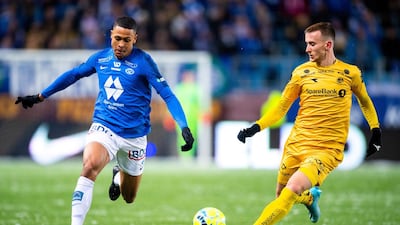As his Manchester United team were again struggling to win a league match on Sunday, Ole Gunnar Solskjaer’s former club Molde were winning the Norwegian title for the fourth time in their history.
That first win came under Solskjaer’s leadership in 2011 and he followed it up with another title a year later. Solskjaer then led his side to second in 2018, but the team he left became champions this year.
Molde are a well-organised and well-funded club from a town of only 27,000. They have a modern stadium with a capacity of 11,000 capacity and are regulars in European football. They were expected to do well this season and they did, but perhaps more intriguing is the team that finished second.
Bodo Glimt are from the Arctic Circle in Norway’s far north where there can be near 24 hour daylight in the summer – and almost none in the winter under the northern lights. Bodo’s players trained on ice with spikes on their boots before an indoor facility opened in 1991.
The team from the last stop on the Norwegian rail system were defeated 4-2 by Molde in the final game of the season on Sunday, but the defeat barely mattered. Bodo, who have never won the title and have average crowds of just 3,200, had done enough to finish second – known as the silver place in Norway. Under manager Kjetil Knutsen and with several British backroom staff, Glimt will play European football for the first time in 26 years.
“We were expected to be bottom in the league this season – that’s what the experts predicted,” explained Aasmund Bjorkan, a former Glimt player and manager who is now the club’s sports director. Bjorkan is from Bodo and his son Fredrik plays for Glimt. “They said that because we lost our best players after last season, but those journalists didn’t do their job properly because we won eight of our nine games in our pre-season training camps.”
Bodo face several big challenges. Being so far north means they use more of their budget on travel while the cold ensures they can’t train outside in the winter.
Former Glimt player Arild Berg died in July aged 43 after years of struggling with illness and injuries. It hit the town hard. “Arild chose to leave us,” read a statement from his family. The Glimt players all attended his funeral – and lost 6-0 at Valerenga the following day.
Arild’s father and two brothers Runar and Orjan are club legends, top level Norwegian footballers who were good enough to play Champions League football or, in the case of father Harald, a super striker who scored twice in Camp Nou for Lynn Oslo in European competition. All remain tied to Glimt. Orjan’s son Patrick, 21, is a current Glimt first team midfielder and showing huge promise in this tight-knit community.
“It’s a small town, just 50,000, but we are proud of it,” says Bjorkan. “Bodo was bombed during the Second World War but it has been rebuilt and there’s enough to do here.” Although surrounded by outstanding natural beauty, the roar of jets from the large NATO base there is common.
But what drove the turnaround?
“We started in January. The whole group was so focussed that we were able to make big steps,” said Bjorkan when this writer spoke to him after the derby against Tromso.
“We decided to be brave and play our own game home and away, even if we have players injured. We play 4-3-3 with offensive full backs. The whole back four must take the space in front of them.
"We have quick wingers too along with some really good local, energetic footballers who have come into the first team. We took steps in the ability to control the game. We are focused on being offensive, brave and having high intensity and pressure. That allows us to dominate the games because we can win the ball high up the pitch. We have been in a sweet spot this year.”
Glimt will again lose some star players. Hakon Evjen, 19, and son of former Bodo player Andreas, rejected Manchester City to join AZ Alkmaar for a club record £2 million (Dh9.4m). He will follow Alex Tettey at Norwich City and Norway’s national team captain Stefan Johansen at Fulham, both from the academy at Glimt.
“Selling our best players is a fact of life for us,” says Bjorkan. “We got a Swedish player for free and sold him for €1.5 million 9Dh 6m) to a club in Egypt. He earned 60,000 NKR (Dh24,000) a month with us. He’d be earning 20 times that in Egypt. He can secure his own future and we understand our position in the food chain.”
That position means someone is going to play European football in the Arctic Circle next season.


